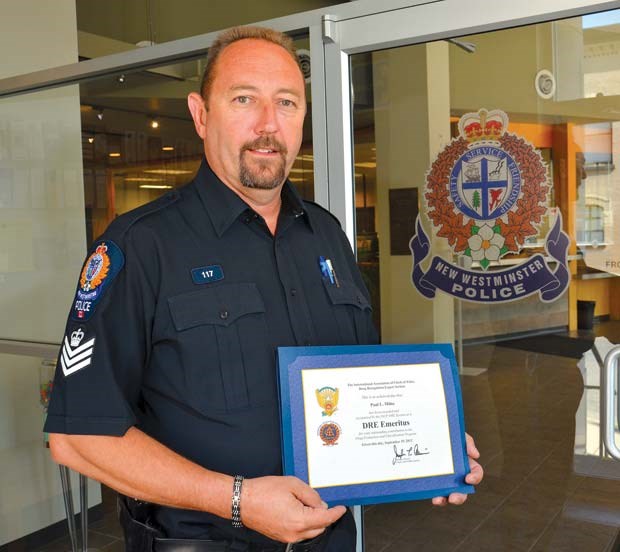It's a familiar scene. Cruiser lights are flashing, an ambulance's sirens squeal in the distance and an officer leans over a driver asks: "How much have you had to drink this evening?"
But what if the answer is "none"? What if the roadside breathalyzer confirms the driver's statement? What if a police officer can tell the driver is impaired but not what's impairing them?
This was the problem many officers were facing prior to the mid-'90s, said Staff Sgt. Paul Milne.
Milne was one of the first Canadian police officers to be trained as a drug recognition expert when the international program arrived in B.C. in 1995. The program, referred to as the DRE, was developed back in the 1970s when officers in Los Angeles noticed an increase in impaired drivers with minimal or zero alcohol in their system. Two sergeants from the department contacted various doctors and medical professionals to create a standardized system for recognizing when a driver is under the influence of something other than alcohol - namely drugs.
"There was 25 of us (officers) trained back in 1995," Milne explained.
Milne and the other 24 officers had to complete two weeks of training in B.C. before heading to the States where they received their certification.
"We went to New York, Phoenix and L.A., and we observed live subjects under the influence of drugs. We conducted evaluations on them, and then they (the trainers) tested our toxicology to confirm we were correct."
Today, there are more than 50 drug recognition experts in the province, including one active expert at the New Westminster Police Department. While Milne - who was recently awarded with an emeritus honour for his work in the program - is no longer certified to conduct drug impairment evaluations due to a promotion, it remains a passion of his.
"It's a passion for most of us, and if you talk to probably 95 per cent of the officers involved in the impaired driving investigations, those that are passionate, have been affected somehow," he said.
In 1980, Milne was involved in a serious car accident on his way home one night with some friends. The group had piled into a tiny Honda Civic circa 1978 and was driving down the street near New Westminster Secondary School when a truck hit them.
"We got (in a) head-on with a '68 Chrysler New Yorker," he said. "We had to get cut out of the car. I've got scars and damage left over from that."
Police later concluded the driver of the truck was impaired when he hit Milne and his friends, but what Milne said stuck with him was that the truck driver didn't have a scratch on him, while Milne and his friends had to be cut out of their car.
So when his mentor at the police department suggested Milne join the newly arrived program, he jumped at the chance. After he was certified in 1995, Milne began his work as the drug recognition expert in New West. He said many of the problems he saw on the roads remain the same today, but today officers are trained to look for impairment that may be caused by drugs, not alcohol.
"In the past, we didn't know what to do with (these drivers), but you bring in an officer who's trained in the ... DRE, who would do an evaluation on him to determine what category of drugs they're impaired by," he said.
The most common drug used by impaired drivers on the streets of the Royal City in 1995 was sleeping pills, Milne said.
Today prescription pills remain the top drug of choice for drivers, and a lot of the times drivers don't even realize they're impaired, he added.
"Education is key. That's the only thing we can do. Doctors have to make sure their patients know what they're getting, the pharmacist has to know, and then we have to educate the kids," he said.
Prescription pills fall under the same category of impairment as alcohol, which is classified as a central nervous system depressant, Milne said.
"You look like a drunk, talk like a drunk, walk like a drunk but you've got no odor of alcohol on your breath, then we know it's a central nervous system depressant," he said.
Pills can be especially problematic for teens, Milne said.
A few years back the police department ran a program for parents as a way to educate them on things they may not have known their kids were doing.
One of the big problems at the time was pill parties.
"It was about local kids abusing their parents' prescriptions at their parties - pill parties where you throw all the pills in the bowl and take whichever ones," he said.
And according to Milne, things haven't changed much today. The only way they can, he added, will be through education and consequences.
Most drug impairment cases take a long time to process. The officer has to prove the driver is impaired and what he or she is impaired by, Milne said.
"It's a long process, but at the end there's consequences," he said.
Milne said he was honoured to receive the emeritus status, a rank usually reserved for retired officers.
He hopes he can continue to impart his knowledge and experience to the young officers coming up the ranks.
"They've given me this so I can still be part of the DRE program and then share my knowledge. So when it comes to classes I can teach, I can help out, without having to be recertified," he explained.
www.twitter.com/CayleyDobie



